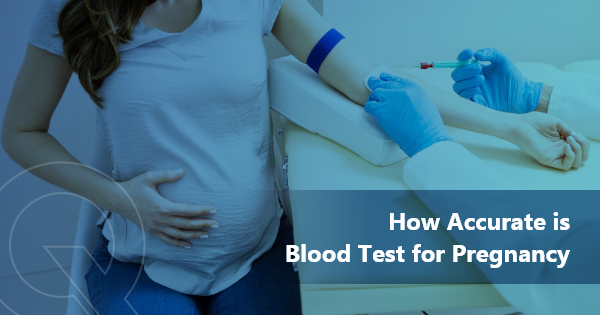Blood tests for pregnancy are highly accurate and considered one of the most reliable methods for confirming pregnancy. These tests detect the presence of human chorionic gonadotropin (hCG), a hormone produced during pregnancy, in the bloodstream. The accuracy of blood pregnancy tests, whether qualitative or quantitative, is well-established, and they can provide early confirmation of pregnancy, often before the typical home urine tests. In this discussion, we will delve into the factors that contribute to the accuracy of blood pregnancy tests and explore why they are frequently utilized by healthcare professionals for diagnostic purposes.
Contents
What is a pregnancy test?
A pregnancy test is a means of determining pregnancy status. A positive result indicates pregnancy, while a negative result suggests otherwise. These tests operate by detecting human chorionic gonadotropin (HCG), a hormone produced during pregnancy.
Early in pregnancy, the body undergoes changes to support fetal development, including a rapid increase in HCG production. HCG levels rise around six to 10 days after conception when the fertilized egg implants in the uterus.
There are two primary types of pregnancy tests: urine tests, which can be taken at home with over-the-counter kits, and blood tests conducted in a healthcare provider’s office. Confirming pregnancy can also be done through an ultrasound performed by a healthcare professional.
People take pregnancy tests for various reasons, such as trying to conceive, concerns about birth control efficacy, or prior to undergoing medical procedures or starting new medications. If you ever have doubts about your test results, it’s advisable to consult your healthcare provider for guidance.
Blood Pregnancy Test Accuracy
Urine pregnancy tests can be highly accurate, with a similar accuracy rate of around 99% as blood tests, as long as you follow the recommended waiting time to take them. In the early stages of pregnancy, HCG levels double every few days. However, urine tests may yield false negatives if the urine is overly diluted due to excessive hydration or if the test is taken too early.
It’s important to note that, like home urine tests, blood pregnancy tests can also occasionally produce false results, although such instances are rare. These false results can include both negative and positive outcomes.
Reasons to take blood pregnancy test
Blood pregnancy tests are more sensitive than urine tests and are commonly used in cases of infertility or when a miscarriage is suspected. These tests can confirm pregnancy as early as 9 days after conception, whereas urine pregnancy tests typically require at least 10 days or more for accurate results.
It’s essential to have a blood pregnancy test performed at a healthcare provider’s office. Your doctor may recommend waiting until after a missed period to ensure the most precise result, as testing too early can lead to false negatives.
Unlike home pregnancy tests that provide immediate results, blood tests require you to wait for the results to return from the lab.
Distinguishing Qualitative and Quantitative Blood Pregnancy Tests
When it comes to blood pregnancy tests, there are two distinct types, both known for their high accuracy.
1. Qualitative Blood Serum Test:
– This test confirms the presence or absence of hCG in the blood, providing a straightforward “yes, you’re pregnant” or “no, you’re not pregnant” result.
– Its accuracy is comparable to that of a home urine pregnancy test.
2. Quantitative Blood Serum Test (Beta hCG Test):
– Also referred to as the beta hCG test, it measures the precise amount of hCG in your bloodstream.
– Thanks to its ability to detect even tiny quantities of hCG, this test is exceptionally accurate.
– Doctors often utilize this test, in conjunction with ultrasound, to diagnose early pregnancy loss.
Disadvantages of Blood Pregnancy Tests
While blood pregnancy tests can be conducted earlier than urine tests, the trade-off is a potentially longer wait for results. The timing for receiving results can vary from one lab to another, spanning anywhere from an hour to several days. It’s important to note that although rare, blood pregnancy test results can sometimes be incorrect.
Additionally, blood pregnancy tests require a visit to your doctor’s office, which can consume more of your time. They tend to be more costly compared to home pregnancy tests, factoring in doctor and lab fees. Given these considerations, many individuals find it more convenient to wait a few extra days to perform a home urine test.
Risk factor
Getting a blood pregnancy test carries minimal associated risks. Similar to any blood test, there is a slight chance of experiencing lightheadedness, fainting, excessive bleeding, infection, bruising at the puncture site, or the formation of a hematoma (accumulation of blood under the skin).
It’s worth noting that the size and accessibility of veins and arteries can vary from person to person and even from one side of the body to the other. This diversity can make obtaining a blood sample more challenging for some individuals, potentially requiring multiple attempts to locate a suitable vein.
Frequently asked Questions
Question: Is it possible for a blood pregnancy test to provide an incorrect result?
Answer: While blood pregnancy tests are highly accurate, they are not infallible. False negatives can occur if the test is taken too early, as the hCG hormone may not be detectable until about a week or two after conception.
Question: How soon can a blood test confirm pregnancy?
Answer: Blood tests are capable of detecting pregnancy earlier than urine tests, typically around six to eight days after ovulation. There are two types of blood tests used to confirm pregnancy: the quantitative blood test (or beta hCG test), which measures the exact hCG hormone levels in the blood.
Question: Can a urine pregnancy test show negative results while a blood test shows positive?
Answer: Yes, it is possible for a urine pregnancy test to yield a negative result while a blood test shows a positive one. This can occur because blood and urine contain different isoforms of hCG, meaning that a certain hCG concentration in the blood may not always produce a positive result in a urine test.




![Blood Test for Hair Loss [Male/Female] Blood Test for Hair Loss](https://oncquest-blog.s3.ap-south-1.amazonaws.com/blog/wp-content/uploads/2023/12/12044200/Blood-Test-for-Hair-Loss.webp)
